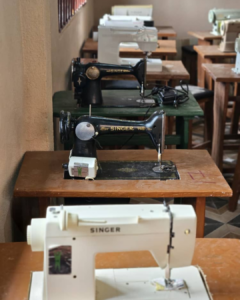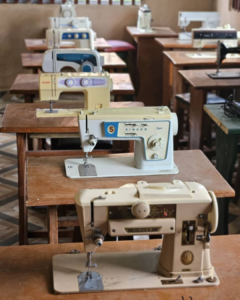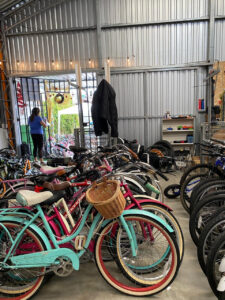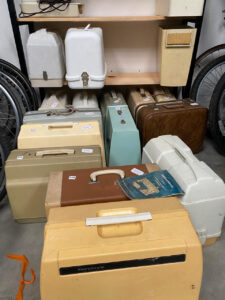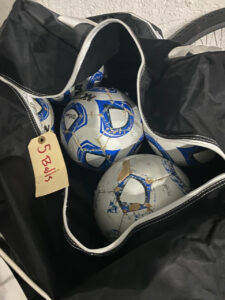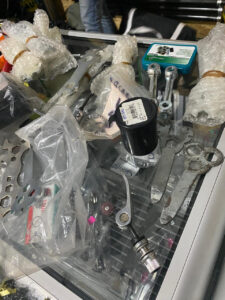All posts by Michael Sabrio
Protected: A Heartwarming Visit to Memaliaj: Fulfilling Dreams and Spreading Joy
Sierra Leone 2025: Village Care Initiatives
In Sierra Leone, our newest Sewing Peace partnership with Village Care Initiatives has officially launched, educating women on how to sew using donated machines from donors like you. By donating machines directly to community outreach centers like Village Care Initiatives, we can educate people while providing the tools necessary to put this education into action.
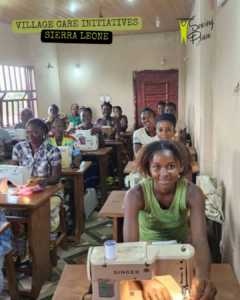 Village Care Initiative is spearheading basic sewing instruction bolstered by education in hygiene, sanitation, and self-care guided by WASH. WASH (Water, Sanitation, and Hygiene) is a comprehensive approach aimed at ensuring universal access to safe drinking water, adequate sanitation facilities, and proper hygiene practices.
Village Care Initiative is spearheading basic sewing instruction bolstered by education in hygiene, sanitation, and self-care guided by WASH. WASH (Water, Sanitation, and Hygiene) is a comprehensive approach aimed at ensuring universal access to safe drinking water, adequate sanitation facilities, and proper hygiene practices.
Program director Shed Jah on how his program is tackling these issues: “We strive to provide comprehensive WASH programming in the communities we serve based on the unique needs of each community. Whether it is a project that provides all aspects of WASH – from improved water access, upgraded sanitation services, and hygiene education in schools and healthcare facilities to menstrual hygiene management – or simply one or two of these components, all our projects are sustainable, and the communities are able to independently support the resources and programs we provide.
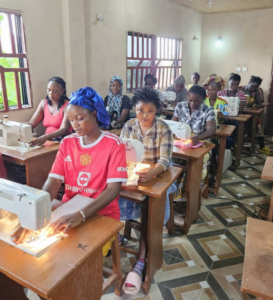 Many of our community projects include an income-generation component around the small-scale manufacturing of WASH-related products such as eco-soap or reusable menstrual hygiene pads. Often, these products are difficult to find or people simply can’t afford them. By teaching community members how to produce these products, we not only ensure that hygiene materials are available to them, but that they can also be sold for household income and donated back into the community programs.”
Many of our community projects include an income-generation component around the small-scale manufacturing of WASH-related products such as eco-soap or reusable menstrual hygiene pads. Often, these products are difficult to find or people simply can’t afford them. By teaching community members how to produce these products, we not only ensure that hygiene materials are available to them, but that they can also be sold for household income and donated back into the community programs.”
Thank you to all our donors and supporters who are key in procuring these sewing machines that are changing the lives of women in Sierra Leone and their local communities.
Hola de Fidesma
From: Fundacion Fidesma
Date: November 27, 2024 at 4:49:37 PM EST
To: David Schweidenback
Don David, muchos saludos departe los compañeros de Fidesma.
Ya realizamos la revision de bicicletas y su inventario, y estamos agradecidos por mandarnos las Maquinas de cocer. Gracias por las pelotas, por las llaves, por otros accesorios o repuestos, mas los plwod. que siempre lo necesitamos.
Todo esta muy bien, las Bicicletas estam bonitas, y estamos iniciando las primeras ventas y entregas de bicicletas.
Espermos enviarle mas fotos y las historias de como se utillizan aqui las bicis.
Atentamente,
Margarita Caté de Catú and the entire FIDESMA ECOLOBICI team
Chimaltenango, Guatemala
Meet Kevaun Mckesey, Belize Bike Program
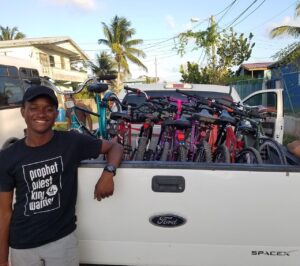 Kevaun Mckesey, a 22-year-old from Belize, is an inspiring young man who has been part of our organization for the past two years. In that time, he has consistently demonstrated determination, honesty, supportiveness, and an unwavering work ethic. In a nation where many young men his age face challenges such as gang involvement, incarceration, or untimely deaths, Kevaun stands out as a beacon of hope and purpose.
Kevaun Mckesey, a 22-year-old from Belize, is an inspiring young man who has been part of our organization for the past two years. In that time, he has consistently demonstrated determination, honesty, supportiveness, and an unwavering work ethic. In a nation where many young men his age face challenges such as gang involvement, incarceration, or untimely deaths, Kevaun stands out as a beacon of hope and purpose.
Currently, Kevaun oversees the assembly operations for our bicycle sustainability program. His leadership and dedication have propelled our bicycle sales to new heights. Through this program, we are not only able to employ Kevaun but also provide opportunities for others, offering fair wages and sustainable employment.
Recently, we were thrilled to secure a scholarship for Kevaun to pursue his educational goals. Starting in January 2025, he will begin online classes at Carolina University in North Carolina.
We are deeply grateful for Kevaun — not just for his contributions to our organization but for the positive impact he represents for the future of Belize. His story reminds us of the incredible potential that lies within our youth when given the opportunity to thrive.
Collection Sponsors, 2024
- Panther Lake Camping Resort
- Westfield Rotary Club
- Newtown Rotary Club
- St. Andrew’s Episcopal Church
- Vineland Rotary Club
- Pilgrim Presbyterian Church
- Chester County Solid Waste Authority
- St. Johns Episcopal Church
- Women’s Club of Paramus
- Bernardsville United Methodist Church
- Monmouth Social Club
- Sri Sathya Sai Global Council Center of Bridgewater
- Temple Beth-El
- Millburn Earth Day
- Rotary Club of the Rockaways
- Warren Hills Computer Science Club
- Piscataway Magnet School
- Passaic County Office of Solid Waste & Recycling
- Rotary Club of Norristown
- Faith Lutheran Church
- Summit/New Providence Rotary Club
- Clinton Presbyterian Church
- St. Joseph Church
- East Hartford Rotary Club
- East Stroudsburg Rotary and the Smithfield’s Rotary
- Knights of Columbus Council 10830
- Christian Brothers Academy
- Friends of Sean Mullen
- St. John’s Episcopal Church
- Pedals for Progress Vermont & Returned Peace Corps Volunteers
- Livingston Rotary Club
- Doylestown United Methodist Church
Ya recibimos las bicis en Fidesma
From: Fundacion Fidesma
Subject: Ya recibimos las bicis en Fidesma
Date: November 22, 2024 at 2:24:13 PM EST
To: David Schweidenback
Hola, Don David, le informamos que ya tenemos las bicicletas en Fidesma, despues de un largo tramite, en la Aduana Guatemala.
Siempre es una experiencia, diferente, cada vez que las recibimos.
De todo tipo de problemas nos presenta el Puerto en Guatemala, dicen que ya no pueden acelerar tramites porque hay mucho BArcos, y muchos contenedores, tambien que nos toco pagar almacenaje porque nos pasamos de los dias permitidos, en el puerto, pagamos mas dinero, y luego que habia dias de asueto en Guatemala, tambien que los dias sabados y domingos no hacen tramites, y asi muchos problemas nos dan ellos.
Muchas gracias David, por las bicis, estan muy bonitas, y gracias por las Maqinas de cocer. Enviaremos fotos de lo que se a hecho aqui,
Atentamente
Margarita CAte
y todo el equipo de compañeros de Fidesma ECOLOBICI.
Chimaltenango, Guatemala.
Notes from Guatemala, November 2024
FIDESMA, November 22, 2024
From: Fundacion Fidesma
Date: November 22, 2024
Señor David,
We’ve finally received the bicycles at Fidesma, after a long process at Guatemalan Customs. Every container is a different adventure.
The port in Guatemala always gives us all sorts of problems. They say they can’t expedite the paperwork because there are too many ships and containers. We also had to pay extra storage fees because we exceeded the allowed days at the port. Then there were holidays in Guatemala, and they don’t process paperwork on Saturdays and Sundays, and so on. They give us many problems.
Thank you very much, David, for the bikes. They are very beautiful, and thank you for the sewing machines as well.
Sincerely,
Margarita Caté de Catú and the entire FIDESMA ECOLOBICI team
Chimaltenango, Guatemala
Translated from the Spanish original
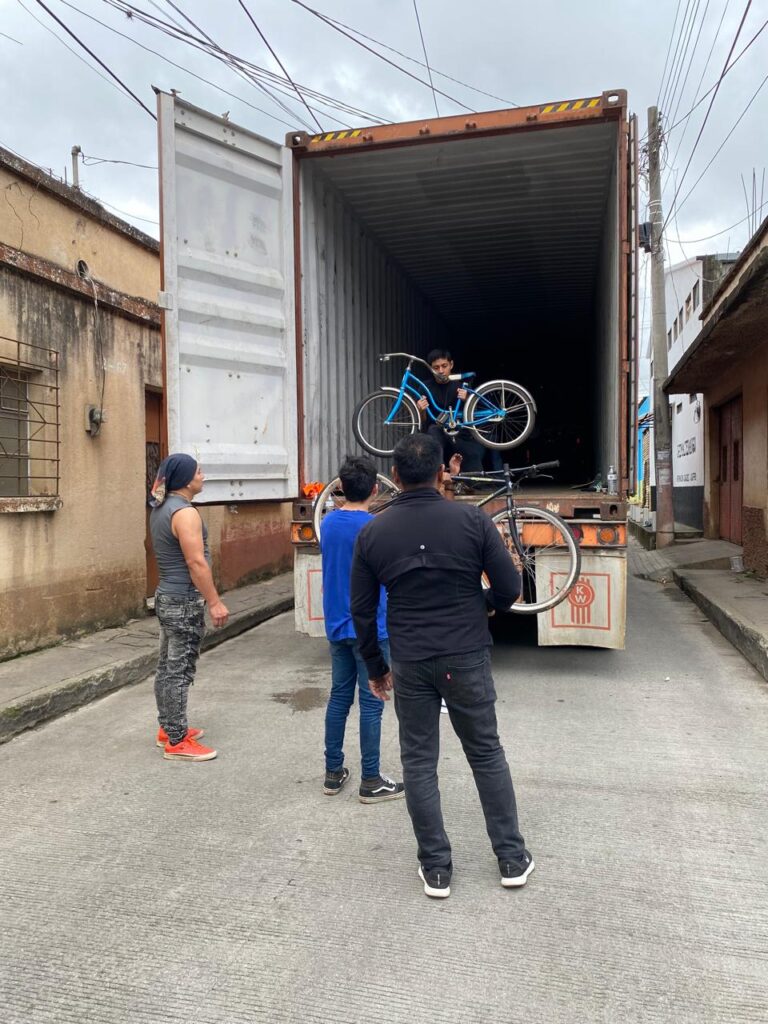
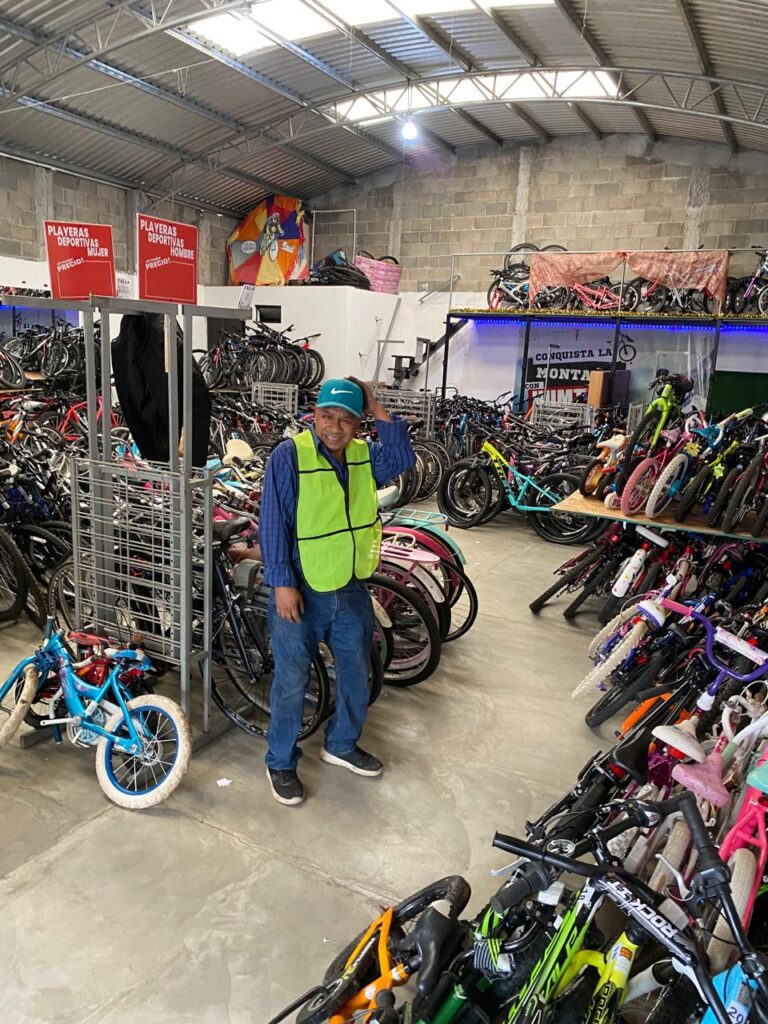
FIDESMA, November 27, 2024
From: Fundacion Fidesma
Date: November 27, 2024
Señor David,
Best regards from the FIDESMA team.
We’ve finished checking the bikes and doing the inventory. And thanks so much for sending the sewing machines. We really appreciate the soccer balls, bike tools, spare parts, and especially the plywood — it’s always handy.
Everything looks great. The bikes are beautiful, and we’ve already started selling and delivering them.
We’ll be sure to send you more pictures and tell you all about how the bikes are being used here.
Sincerely,
Margarita Caté de Catú and the entire FIDESMA ECOLOBICI team
Chimaltenango, Guatemala
Translated from the Spanish original
Protected: P4P/SP 2024 Annual Report: 10/01/2023 to 09/30/2024
President’s Message, Fall 2024
JUST WOW!
I’d like to sincerely thank everyone working behind the scenes with me for making this year—and particularly this fall—a wonderful success in our little world of bikes and sewing machines! Thanks to the very long list of groups and individuals we collaborate with, we have officially shipped our 170,000th bike since our founding in 1991.
While this milestone may not call for a red-carpet rollout, it is a significant and satisfying number that reflects the immense generosity I have felt from all of you this year. This fall alone, our collections averaged 65 bikes per collection, allowing us to make three shipments of bicycles to Guatemala, Belize, and Albania.
Of course, no successful season comes without its challenges. We experienced a few bumps along the way, particularly due to massive shipping delays caused by the five-day longshoreman strike that began on October 1st. Although the strike itself was brief, it set us back weeks in planning and cost us hundreds of dollars, delaying our first fall shipment to Guatemala. The ripple effects of the strike also delayed the arrival of our annual shipment of bikes from Vermont—made possible by FedEx—because the loaded Guatemala container was stuck in our warehouse, accruing costs daily.
The shipping industry experienced widespread disruptions, with weeks of delays and difficulties securing empty containers. Vessel bookings were frequently changed, adding to the uncertainty. While these were overwhelming days, we were able to persevere and navigate through the challenges thanks to our steadfast team and supportive network.
I’d like to extend a special thanks to the Newtown Rotary Club, which stepped up to help us when our storage overflowed with bikes. Due to shipping delays and a series of incredible collections, P4P faced the rare problem of having too many bikes. Thankfully, Jerry and the Newtown Rotary, particularly Alan Fidler, held onto the 150 bikes they collected for an additional three weeks. Those bikes are now officially on their way to Albania.
Beyond these logistical challenges, I’ve been absolutely overwhelmed by the incredible domestic support we’ve received this year. Having “too many bikes” is a problem I hope to face every year!
To continue this momentum, we’ve partnered with Marty’s Reliable Cycle, which is now accepting bike donations for us at its five locations across the state. Offering donors the option to drop off bicycles year-round has been a goal of mine. It pains me to turn down a donation in the middle of winter simply because our operations are closed. Thanks to this new partnership, donors can now drop off bicycles at any Marty’s Reliable location year-round.
We ask that donors continue contributing our requested $20 per item to help offset shipping costs. While Marty’s provides the drop-off locations, there are still costs involved, as we must make regular trips to retrieve donated bikes and maintain their storage spaces. Drop boxes at each location will be available for cash or check donations, and receipts will be provided. I’d like to thank Stephen Ellerman and the Morristown Rotary Club for helping us get this partnership underway. I’d also like to express my gratitude to the man behind it all, Jesse Epstein, who has been instrumental in this endeavor, continuing the remarkable legacy of generosity established by his late and great father, Marty.
Internationally, our programs abroad continue to thrive, making significant improvements in the communities they serve. Absolute Bikes in Albania received a container of bicycles from Working Bikes in Chicago earlier this year, meeting their spring demand and tagging us back in for a shipment this fall. FIDESMA in Guatemala received its annual shipment, further cementing a 25-year tradition of collaboration with P4P. Belize accepted its fifth shipment, which is particularly special to me after witnessing their program firsthand. Their efforts to provide homes and sewing machines to single mothers in need are inspiring, all made possible by your donated machines and the funds raised through bicycle sales.
In Africa, we supported an exciting new program with a shipment of 450 bikes destined for rural farmers. These bicycles are expected to significantly improve the daily lives of farmers by providing much-needed transportation.
There’s so much great news from this fall and the year as a whole, which I encourage you to read about in this year’s newsletter. This is always a special time of year for us at P4P. As we close our doors for the winter to prepare for spring collections, we take this opportunity to reflect on and share the incredible achievements made possible by your generosity. We also look ahead to the coming spring, when we’ll once again be ready to accept your donations.
I’m incredibly excited for the next season and hope to see many of you along the way. I encourage you to learn more about the amazing work being done overseas—it’s a powerful reminder of just how transformative a bicycle can be. In the meantime, thank you for your continued support and belief in our cause. Wishing you all a wonderful holiday season!
“presidentsMessage.html” 25 lines, 5210 bytes written

